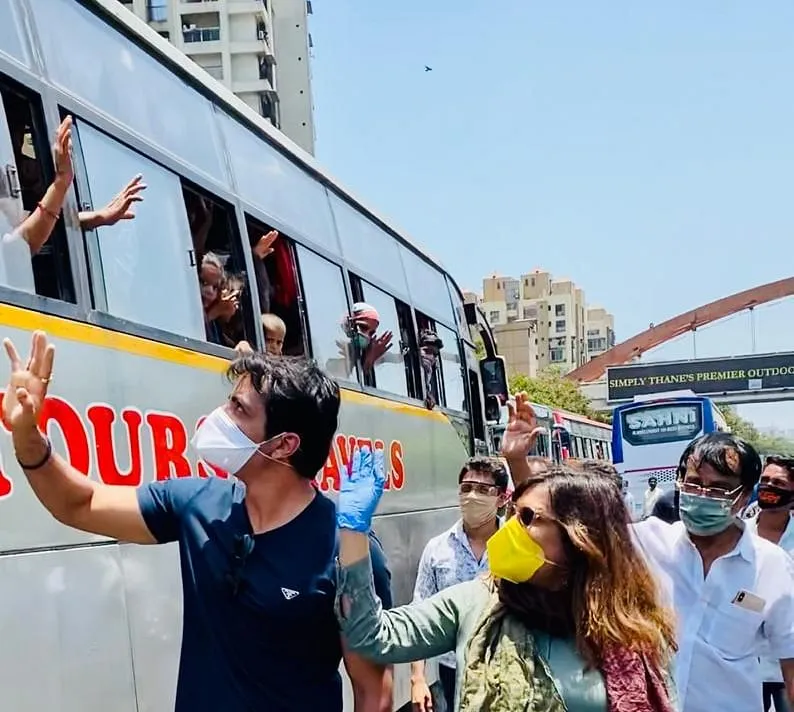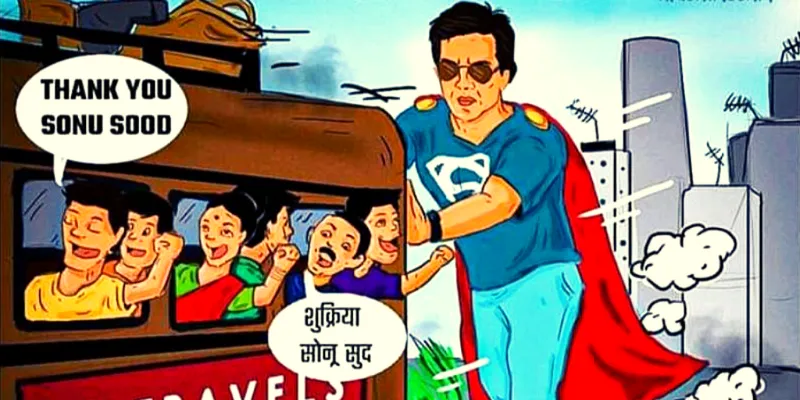From reel-life villain to real-life superhero, Sonu Sood inspires hope amidst India’s migrant crisis
Actor Sonu Sood – who has been hailed for helping migrant workers amidst the COVID-19 pandemic – talks to YourStory about how his late parents are an inspiration for his many random acts of kindness.

Actor, producer, and humanitarian Sonu Sood
Actor Sonu Sood has ascended to real-world superhero status almost overnight amidst the ongoing COVID-19 pandemic.
The actor – best known for essaying villainous roles in Indian cinema – is being hailed for turning good samaritan for thousands of migrant workers during the two-month-long coronavirus-induced lockdown.
But Sonu Sood is no stranger to random acts of kindness and generosity – deeds he attributes to the lasting influence of his late parents, father Shakti Sagar Sood and mother Saroj Sood.
Albeit a lesser-known-fact, the actor – who has been helping migrants stranded in Mumbai city return to their homes and villages – has always been a keen social activist and philanthropist.
To be sure, Sonu – who shot to fame with his portrayal of the antagonist Chedi Singh in the 2010 Salman Khan-starrer Dabangg – is better known for his roles in more than 60 films across six different languages.
During his two-decade-long film career, the actor has starred in blockbuster films such as Simmba, alongside Ranveer Singh, Happy New Year, alongside Shah Rukh Khan, and Kung Fu Yoga, alongside international actor Jackie Chan. In 2016, he also launched his own production house, Shakti Sagar Productions, named after his father.
And yet, even while pursuing his passion for acting, Sonu has simultaneously sought various avenues to do social good.

Sonu Sood and his friend Neeti Goel launched the Ghar Bhejo initiative to help migrants who are stranded in Mumbai city during the COVID-19-induced lockdown
In the past, the Moga, Punjab-born actor-producer has supported the underprivileged through various initiatives and lent his voice to different causes, including the fight against drug addiction in his home state of Punjab. In 2016, he launched the Saroj initiative – named after his mother – to help acid attack survivors; and since then, he has been committed to helping these survivors as well as other differently-abled people.
Just last year, the actor sponsored the travel and stay for a team of differently-abled students who competed at the Special Olympics Asia Pacific Unified Badminton Championship in Bangkok. Sonu also fulfilled an ardent fan’s lifelong dream last year by travelling all the way to Sri Lanka to attend her wedding.
More recently, in April, the actor launched an initiative called Shakti Annadanam, again named after his late father, to provide more than 150,000 meals daily to the underprivileged in Mumbai.
In fact, on Friday, May 29, Sonu also arranged a chartered flight to take 150 stranded women labourers from an Ernakulam, Kerala-based factory to their home state, Odisha.
One can go on but, admittedly, these acts of kindness come naturally to him.
Sonu Sood’s inspiration: his late parents
For the engineer-turned-actor, these are but the result of life-lessons and values taught to him and his sisters, Monika and Malvika, by their late parents.
“My mom and dad were the major inspirational pillars of my life. They taught me that you’re successful only if you’re able to help someone,” Sonu told YourStory by phone from Mumbai.
By that measure, Sonu’s success stands unrivalled for the sheer number of people he has helped.

Sonu Sood's late parents: father Shakti Sagar Sood and mother Saroj Sood (Image credit: Sonu Sood)
Since India went under complete lockdown over two months ago, Sonu Sood has undertaken several initiatives to help the underprivileged – be it donating personal protective equipment to frontline workers in Punjab, providing ready cooked meals to the poor, or offering his hotel in Mumbai’s Juhu suburbs to coronavirus frontline healthcare warriors such as doctors and nurses for their use.
But it’s his most recent effort – a massive personal undertaking to ensure every migrant worker finds his or her way back home – that has won the hearts and captured the imaginations of millions in this period of rampant gloom and doom.
“All that my parents have taught me my entire life is now being reflected in my deeds,” Sonu told me at the end of another 21-hour-long working day spent coordinating logistics, obtaining permissions, and distributing food for hundreds of migrant workers being sent home that day to Bihar.
Long days, longer nights
Ironically, at a time when many of India’s urban population are lamenting the sudden abundance of time during the nationwide lockdown, Sonu Sood is finding himself busier than ever.
His day starts as early as six in the morning and goes on into the wee hours of the following morning.
During this time, he and his team carry out a host of tasks – reaching out to authorities at different levels in various states to obtain permissions, sifting through countless requests pouring in through various channels, and coordinating with the migrant workers, among others.
“Now my day is no longer 18 hours; it’s almost 20 to 22 hours long. We hardly sleep because there’s just so much to do,” Sonu tells me.
As part of the ‘Ghar Bhejo’ or ‘Take (them) home’ initiative, which Sonu launched with his childhood friend and restaurateur Neeti Goel, the duo and their growing team have sent more than 18,000 migrants back to their homes in less than a month. The initiative, powered by Lala Bhagwandas Trust, is supported by Khaana Chahiye, a movement to end hunger during the lockdown.
For the team, the most fulfilling task has been flagging off buses filled with happy migrant workers, eager to start their journey home.

Illustration credit: Hrishikesh
Sonu says he was stirred into action after he came across scores of migrants, primarily daily wage earners, who were determined to set out on foot to far-off destinations, many over 1,000 kilometres, in a desperate attempt to return home to their families.
As a migrant himself, having come to Mumbai in 1998 with just Rs 5,500 in his pocket to make a career in show business, Sonu is only too familiar with the trials and tribulations faced by India’s many migrants who move to the bigger cities in search of employment.
India’s nationwide lockdown, currently in its fourth phase, has been a massive effort to stem the spread of coronavirus through large-scale containment, save for essential services. However, with business activity coming to a standstill amidst the lockdown, India’s migrant workers and daily wage earners have been the worst hit, hurt by the lack of any source of income amidst depleting resources and an overwhelming sense of fear and grave uncertainty.
Currently, the number of coronavirus cases in India has climbed to more than 160,000 from around 600 when the lockdown first started on March 24.
ALSO READ

A migrant helps migrants
As the number of coronavirus cases continued to grow, many stranded migrants in India’s metros took to the highways with their families and baggage in tow, choosing to walk for days on end in the hope of being reunited with their families, instead of languishing in the cities.

Moga, Punjab-born Sonu Sood came to Mumbai city in 1998 as a migrant looking to make a career in show business. Pictured here is his Mumbai local train pass issued at the time.
“When I saw all these migrants on the highways, risking their lives, and so many people losing their lives during their journey, I realised that it’s very important to come forward and do something meaningful for them. I felt that was the need of the hour,” says Sonu.
He began by convincing a group of migrants, who were about to set out on foot to Karnataka, to hold off on doing so for two-three days so he could try and make arrangements to send them home.
True to his word, Sonu obtained all the requisite permissions from the Karnataka and Maharashtra state governments as well as medical clearances for these migrants to go home.
After that, the rest, as they say, is history.
Ever since the actor flagged off the first bus with 350 migrants to Karnataka, he has been flooded with similar requests from many others.
The requests come via WhatsApp, in-person meetings, social media, and a toll-free helpline number (18001213711) he recently launched for the migrant workers. Fearing that all the migrants may not have been able to reach his team using the helpline number, Sonu shared yet another phone number (9321472118) where requests can be sent.
He makes it a point to respond to these requests personally, asking many to send him their details so he can come to their aid.
“Details bejo (send details)” or “number bejo (send your phone number),” are familiar lines Sonu writes in response to requests for help – lines that have inspired hope and become almost iconic amidst India’s migrant crisis.
So far, Sonu and his Ghar Bhejo team have sent hundreds of buses with migrants to every corner of the country – to Uttar Pradesh, Uttarkhand, and Rajasthan in the north, to Karnataka and Kerala in the south, and Odisha, Bihar, and Jharkhand in the east.
Despite this palpable impact, Sonu’s concern is for the thousands more from other states whom he hasn’t yet been able to help.
“I want to help people from Tamil Nadu, Andhra Pradesh, and Telangana too, but many of these states are not accepting people from Maharashtra at this time because of the sheer number of cases here,” Sonu says.
Maharashtra has been one of the hardest hit states, with cases mounting to more than 56,000, accounting for a third of the total number of confirmed COVID-19 cases in the country.

Sonu Sood shared this message for migrants with toll-free helpline numbers through which they can reach out to him and his team for help
Leveraging privilege for good
Sonu has also been leveraging his contacts to help people stranded in other states, obtaining permissions for interstate travel for individuals travelling by private vehicles, and even chartering a plane for women labourers from Odisha.
“The idea is to help every migrant who helped us build our roads, our offices, and our homes. They can’t be homeless. We have to make sure that everyone reaches their home safely. That’s the journey that I’m in and hopefully, I will be able to accomplish that,” says Sonu.
So infectious is his commitment to the Ghar Bhejo cause that the actor has now inspired many of his friends, including those from the film fraternity, to join him in this movement. They include director and choreographer Farah Khan Kunder, director Rohit Shetty, and actor Tabu, among others.
In addition, Sonu’s wife Sonali, his chartered accountant Pankaj Jalisatgi, his friends Neeti Goel, Harsh Sikariya, and KK Mookhey, along with many other members of his inner circle of friends and family are taking care of different parts of the initiative, making it a smooth, seamless process on the ground despite the increasing workload.
“My team is growing every day with a lot of people coming forward to organise food or participate in the distribution and help with logistics and management of who will board which bus. All these small tasks also need a lot of effort, so it’s really a team effort,” says Sonu with humility.

The Ghar Bhejo and Khaana Chahiye teams wave goodbye to migrants bound for Karnataka's Gulbarga district (Image courtesy: Khaana Chahiye)
Much of the financing for these initiatives have been borne by the actor himself, although now the team is seeing many people step forward to contribute.
“Regarding the funding of these campaigns, we started on our own, but a lot of people are now keen to help and be a part of this movement. I am glad that we could spread that message across that we can do it together,” Sonu tells me.
The start of Shramik Express trains, which was organised by the government for people stranded in different parts of the country during the COVID-19 lockdown, has also helped in transporting many back home, lowering the number of those travelling by road, Sonu adds.
“But then again, there are millions of people stranded, and as trains are limited to certain places, they can’t cater to the millions of migrants who are walking on the streets and don’t have food to eat. So, I think that really needs to be addressed, and I intend to work till the last migrant reaches his home,” he says.
Accolades galore
For his humanitarian acts during the COVID-19-induced lockdown, Sonu has received much praise and appreciation from people of all walks of life – from Union Minister of Textiles and Women and Child Development Smriti Irani, Punjab Chief Minister Captain Amarinder Singh, and Maharashtra Governor Bhagat Singh Koshyari to veteran batsman Suresh Raina and opener Shikhar Dhawan to actors Ajay Devgan, R Madhavan, and Vivek Oberoi, among others.
Recognition for his efforts have also come in other forms – particularly from migrants.
One migrant family named their newborn son after him. Others have recommended that the actor be recognised with the Bharat Ratna, India’s highest civilian award, while yet others are creating sand replicas and reportedly building a statue in his image.

Migrants make a sand sculpture of Sonu Sood to show their appreciation for his humanitarian acts amidst the COVID-19-induced lockdown (Image credit: Sonu Sood)
Sonu accepts all these notes of appreciation with the same humility he grew up seeing his parents display.
Sonu’s mother, a professor by profession, was known for teaching underprivileged students for free and tutoring over 150 children daily at her home. She was a firm advocate of giving to the needy and helping others in any way one can, Sonu recalls.
“My mom taught me that no one has become poor by giving to the poor. I feel fortunate that God has chosen me as the tool to help others, and that I’m in a position to help others,” says Sonu, who has taken up various causes in the memory of his late parents.
The joy of giving
In fact, Sonu admits that his “…biggest personal learning during this time has been that there’s nothing more important than serving someone who really needs you.”
His greatest reward, he says, is seeing the smiles of every migrant who has returned home, and receiving their messages of gratitude.
“They (the migrants) send selfies, messages, and voice notes or call us via video call to thank us and inform us that they are safe now. I think seeing these people reunited with their families has been the most special feeling I ever had in my life,” he adds.
With offers now pouring in to contribute to their initiative, Sonu’s message to many of these volunteers is simple: help a needy person near you instead.
He says, “In times like this, I think every human being should come forward and do something good. Don’t sit idle and don’t feel like you have nothing to do. Instead, help someone – a vegetable vendor or a watchman or anyone who needs help – because you can make a difference in their lives.”
Undoubtedly, in Sonu’s own journey to make a difference, he has only just begun.
“The journey is on but there’s still miles to go,” he says.
Edited by Megha Reddy and Diya Koshy George









